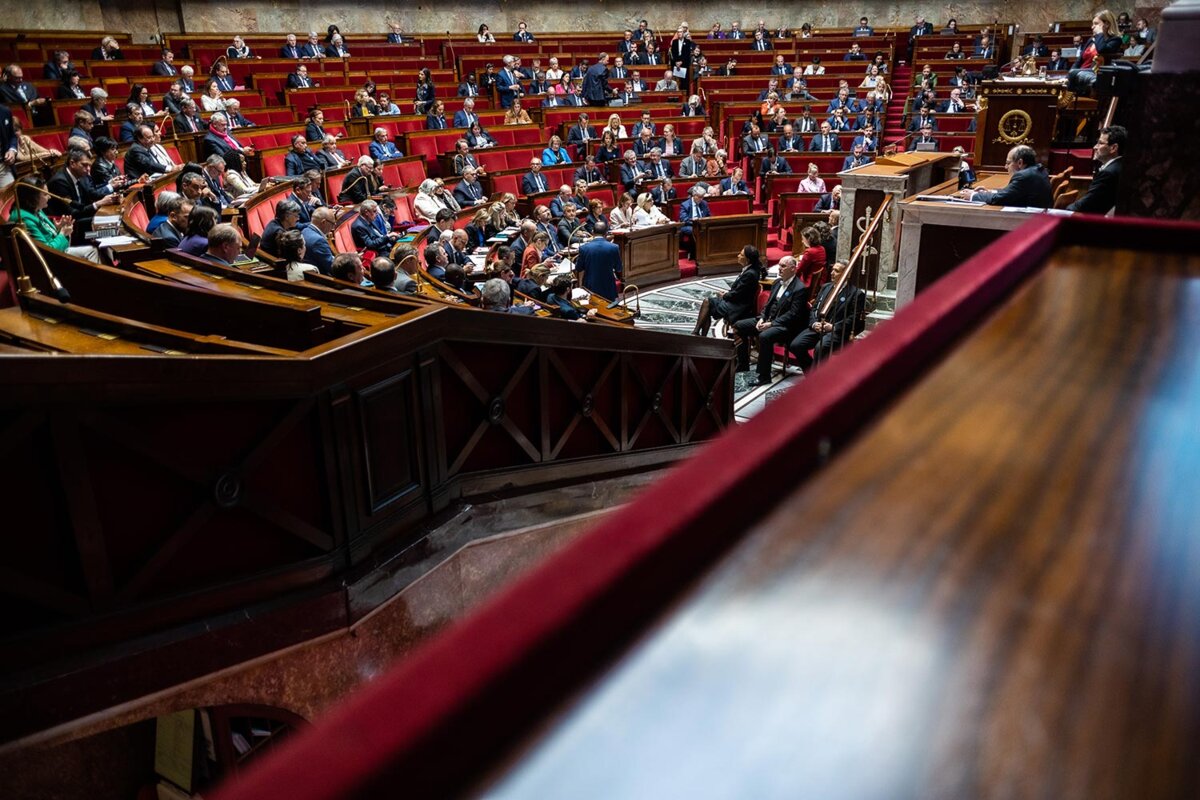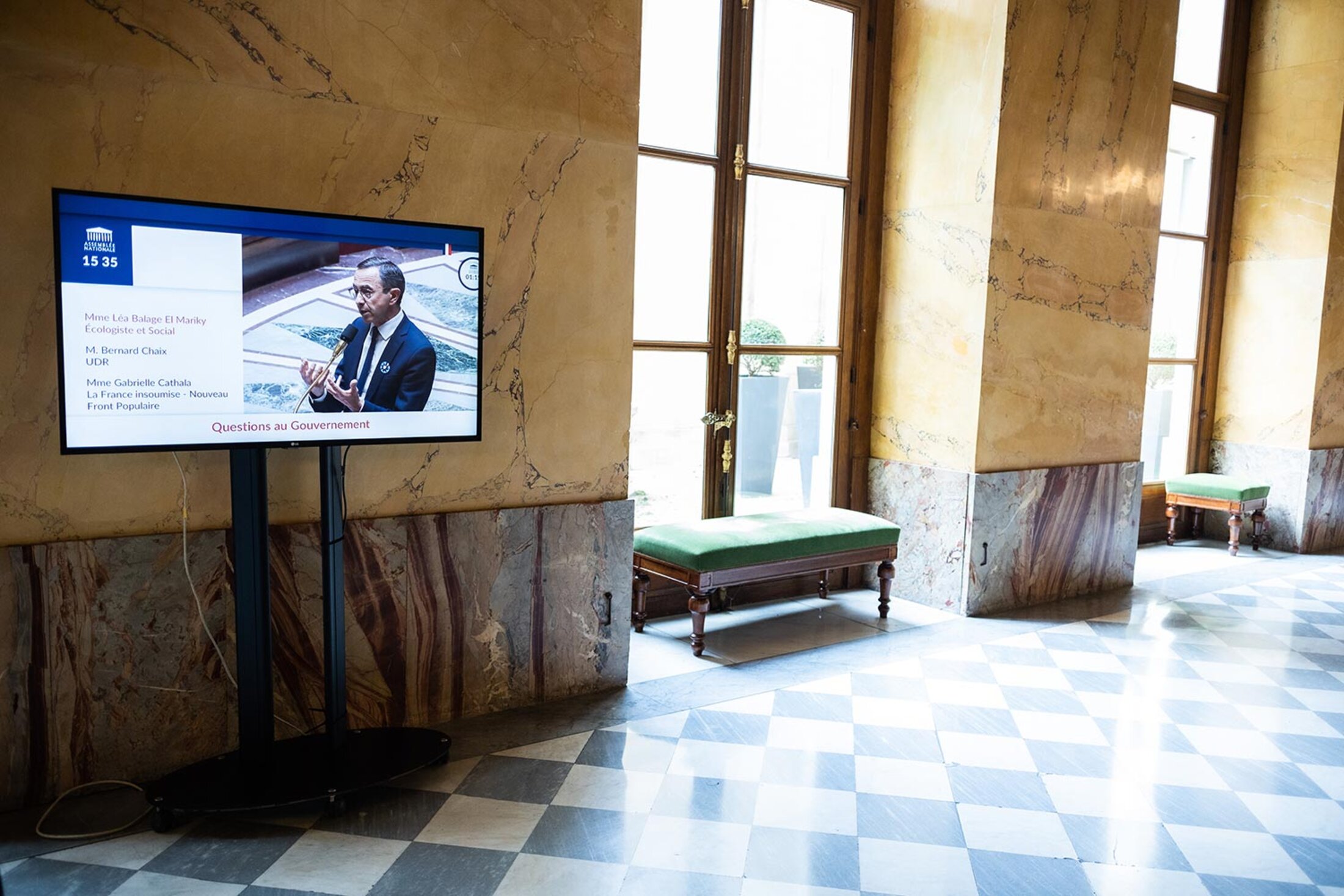“It's so boring!” According to centre-right MP Frédéric Valletoux, who chairs the National Assembly's social affairs committee, this phrase is now regularly heard in the corridors of the Palais Bourbon, the building that houses the French Parliament's lower house. And he is close to agreeing with the sentiment behind it, if not the exact choice of words. “We’ve got no direction, no strategy, we don’t know where we’re going and no one’s enjoying it,” he says. The MP, who is from the Horizons party headed by former prime minister Édouard Philippe, admits to “very mixed feelings” about a parliamentary year which has been quite unlike any other.
“Chaotic”, “pointless”, “ridiculous”; a year after the shock of the dissolution abruptly announced in June 2024 by President Emmanuel Macron, these same words keep cropping up to describe this 17th legislature of France's Fifth Republic, which began amidst political turmoil: a stormy autumn of budget wrangling, followed by a tempestuous winter that saw the historic fall of the Barnier government. Since then, the Assembly has staggered back into motion, buffeted by the swirling disorder of world events. And during this spring and early summer of 2025, a sense of weariness has taken hold among the parliamentary ranks.
“We’re an institution facing boreout,” is the view of Socialist Party group leader Boris Vallaud, referring to that workplace affliction where people feel both useless and deeply bored. “What we’re going through at the National Assembly right now is a display of our own powerlessness,” Marc Fesneau, leader of the centrist MoDem group, said in L’Opinion newspaper in early June, warning that the situation could “play into the hands of those who find it more efficient to stop legislating altogether”.

Enlargement : Illustration 1

Manuel Bompard, MP for the radical-left La France insoumise (LFI), echoes the views of his fellow members. He admits that when he returns south to his Marseille constituency, he barely mentions his work in the Palais Bourbon. “During my first two years as an MP [between 2022 and 2024], all my public updates were about what I was doing at the Assembly; now, I can no longer find anything to cobble together. Politics has moved elsewhere, around Trump or Gaza,” he observes.
A sure sign that the glory days of parliamentary battles are over came on June 5th, when a long-awaited symbolic vote calling for the repeal of the recent pension reform passed with barely a ripple in the media. The Communists, who were behind the non-binding motion to challenge the 2023 Dussopt law that introduced the reforms, were left furious after Macron-supporting MPs openly boycotted the vote, doing their best to strip it of meaning and dismissing it as a “charade”.
A proliferation of ‘little’ laws
Paradoxically, beneath the sense of sluggishness and apparent boredom, an explosion of activity has taken place in the rarefied world of Paris’s 7th arrondissement in recent months. Since early 2025, a flood of private member’s bills has poured into the Assembly. Unlike government bills, these do not require an impact study or a review by the Conseil d’État - the government's advisory body on the Constitution - which makes them far easier to submit, thus opening the door to a torrent of topics.
Hence the glut of very varied legislative texts that MPs have had to vote on lately. These have ranged from creating a new traffic offence of causing death by dangerous driving, to letting workers give blood during work hours, and scrapping the National Assembly procedure under which MPs are asked to either stand or stay seated to indicate their vote on a measure. Also on the agenda has been banning disposable vapes, reopening rural bars or cafés, curbing aggressive sales cold-calling, easing the rules on shared inheritances, capping bank charges, tackling the Asian hornet, and raising awareness of laughing gas misuse.
We’re a bit like flies against a windowpane: lots of buzzing but no sense we’re responding to the country’s big challenges.
Stripped of their traditional powers - starting with the vote on the budget, which has for three years now been pushed through using article 49-3 of the Constitution which avoids a substantive vote - MPs now find themselves expected to vote on a never-ending stream of texts often seen as trivial, sometimes prompted by stories in the news or by social media storms. It is a time-consuming task, requiring them to read up on all sorts of topics. Above all, it leads to a feeling that they have lost their sense of purpose.
“We’re a bit like flies against a windowpane: lots of buzzing but we’re banging into a glass ceiling, because we don’t feel we’re responding to the country’s economic, social or political challenges,” says Frédéric Valletoux, who notes that an “endless string of legislative bills does not constitute an overall policy”.
Half a dozen bills have been debated on housing, the same number on childhood. In terms of the environment, a scattergun batch of measures across multiple bills has triggered spectacular U-turns. These include restarting the A69 motorway project, walking back the no net land take target, scrapping low-emission zones with no alternatives and cutting funding.

Enlargement : Illustration 2

Even the government’s flagship agriculture legislation, passed in February and billed as the big fix for the farming crisis, needed a bolt-on clause. “Farmers, frustrated by the agriculture bill, got their revenge in the Senate with the Duplomb law,” explains Socialist MP Mélanie Thomin, referring to a measure that reintroduced a banned neonicotinoid insecticide. She sees this as dragging parliamentary democracy into a “reactionary and almost Trump-like” new era.
“Because there was no proper review [editor's note, it passed thanks to an unprecedented procedural measure] we get laws that challenge science and the rule of law, and ultimately end up with a shift in Macron’s ultraliberal wing which is being pulled ever closer to the populist far-right,” the MP laments. “We’re at a time where nothing serious can happen, but where the worst could happen at any moment,” adds her colleague Boris Vallaud.
The return of the ‘old world’
The blame lies with the muddled ideology of the government since the election of Emmanuel Macron in 2017. The former minister for relations with Parliament, Marie Lebec, has conceded that the government has been “unable to put together a coherent body of ideas in seven years”. Then there is the deliberate inertia of current prime minister François Bayrou, whose minority government refuses to “feed” the Assembly with bills for fear of triggering a no-confidence vote. The result is that after the turmoil of late 2024, the institutions risk becoming embalmed in the formaldehyde of a decaying Fifth Republic.
“Sadly, the prime minister’s actions fall far short of what’s needed to help the country recover,” says rightwing Les Républicains MP Fabien Di Filippo, who regrets that the Assembly is left to consider “cosmetic bills - apart from those on agriculture and Mayotte - rather than tackling proper structural legislation”.
The dissolution was the worst mistake of the Fifth Republic. It brought back the old world.
Frédéric Valletoux prefers to focus on the one genuine success: the first reading of the assisted dying bill, which he calls the only “real major bill” so far in this legislature. As for the rest, he says: “We’re indulging ourselves. We keep voting on bills we know won’t be implemented, simply because the government opposes them.”
It is all very logical to the LFI's Manuel Bompard. “François Bayrou has no legitimacy, so he avoids any major debate. We’re dealing with a government without power,” the radical-left MP says. Ludovic Mendes, spokesperson for the Macron-supporting bloc in the Assembly, says much the same. “We should never have gone back to the polls in 2024,” he sighs, pointing to the original sin committed by the president, who then ignored the outcome of those snap elections. “The dissolution was the worst mistake of the Fifth Republic. It strengthened the RN [editor's note, far-right Rassemblement National], LFI and LR, and brought back the old world.”
That same “old world” of parliamentary politics has made a comeback in recent months, with the unexpected return of the Senate as the key player in shaping laws. In a column published on June 12th in Le Monde, a group of Socialist senators warned of the growing number of bills now coming out of the upper chamber, “often steered by Bruno Retailleau”, the former LR Senate leader who is now interior minister.
“This is resulting in some worsening of the legal quality of the legislative texts,” they wrote, “especially as the dubious interpretations of constitutional law, the disregard for European and international agreements, and the lack of serious cost analysis of the proposed measures are not the by-products of a rushed lawmaking process, they are its very aim.” The signatories said the same approach was now being “emulated in the National Assembly”.
A resilient Assembly?
MPs stripped of their powers and swamped by trivial bills, a Parliament whose workings have been distorted and an executive bent on clinging to power at all costs, in defiance of institutional rationale… Is it any wonder some feel like giving up?
Not Emmanuel Maurel, who sits with the Communists in the Gauche démocratique et sociale (GDR) group of MPs, and who is determined to stay upbeat. “Sure, passing a law on cold-calling isn’t the proletarian revolution, but it does have a real impact on people’s lives,” says the MP, who refuses to fuel the view that “MPs are pointless”.
His colleague Stéphane Viry, a former LR member now part of the small Libertés, indépendants, outre-mer et territoires (LIOT) parliamentary group, even sees in the current mess a kind of parliamentary resilience in the face of political deadlock. “It’s been an abnormal, strange year, but not without interest,” he says. “Until Barnier's vote of no-confidence, everyone still stuck to their political colours. But since February, there’s been an unspoken adaptation to the instability, one that’s led to new ways of working in Parliament. Even if it’s not visible, we’ve learnt to talk to each other, behind the scenes.”
An example can be found in the many parliamentary committees of inquiry, where MPs from all parties have joined forces, sometimes smashing stereotypes and tearing down barriers. Here we have seen Macron-supporting Violette Spillebout and the radical-left LFI’s Paul Vannier working together to combat school violence; the LFI MP Éric Coquerel and hard-right MP Éric Ciotti on the budget crisis; and the green MP Sandrine Rousseau and centrist MoDem MP Erwan Balanant tackling sexual abuse in the film industry.
For Macron-leaning MP Nicole Dubré-Chirat, these unusual political “crossovers” offer a flicker of hope in an otherwise grim parliamentary landscape. “The gridlock is in reality pushing us to work more across party lines,” says the MP, who co-led a mission on mental health alongside Sandrine Rousseau. “These permanent talks don’t happen around major bills, so it’s not very visible from the outside, but things are moving forward nonetheless.”
There exists, then, a fragile balance, and one that, with a high-stakes autumn budget season looming for prime minister François Bayrou, could easily shift once more.
-------------------------------------------------------------------------
- The original French version of this article can be found here.
English version by Michael Streeter


